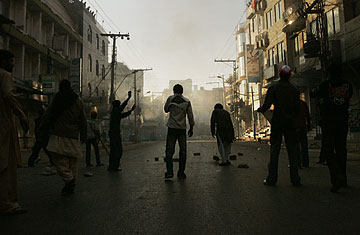
Supporters of slain opposition leader Benazir Bhutto clash with police in Rawalpindi, Pakistan, Dec. 29, 2007
Pakistan's Election Commission announced Wednesday it would postpone elections until Feb. 18, saying that unrest in Pakistan following the assassination of former Prime Minister Benazir Bhutto had made holding polls on Jan. 8 as planned "impossible." More than 10 Election Commission offices have been burnt or ransacked in Bhutto's home province of Sindh over the past few days. New ballot papers and voter rolls will have to be distributed and polling material held up by the rioting sent out.
The postponement, widely expected after days of rioting and violence, angered the leaders of Bhutto's Pakistan People's Party, who had demanded that the election go ahead as scheduled. "It is up to the people of Pakistan to choose their future and the time is now," read a joint statement issued before the announcement by PPP co-chairman Asif Ali Zardari, Bhutto's husband, and leading opposition figure and former Prime Minister Nawaz Sharif. "[Elections] will not only be a tribute to the memory of Benazir, but even more important, a reaffirmation of the cause of democracy for which she died."
Holding elections as soon as possible should be to the PPP's advantage, say Pakistani political commentators, because the party is likely to win a massive sympathy vote in the wake of Bhutto's murder. A lengthy delay could give more time for PPP infighting to tarnish the party, now led by widower Zardari and Bilawal Bhutto Zardari, 19, his eldest child with Bhutto. PPP stalwarts applauded the appointment of Bilawal, an Oxford undergraduate student, but support for the senior Zardari, a controversial figure during Benazir's time in power, is less enthusiastic.
None of that matters to people like Yousuf Naz, a local district leader and PPP officer in Karachi's Lyari slum, a party stronghold. "The government wants to run away from the elections, because the Killer League" — an Urdu-to-English play on the Pakistan Muslim League (Q), which supports President Pervez Musharraf — "see their end in these elections," says Naz. "They have planned [vote] rigging, but we will not allow them to do so. We will sacrifice our lives to prevent it." A senior PPP official said Tuesday that Benazir Bhutto had been preparing to show two visiting U.S. lawmakers evidence that the Election Commission and Pakistan's most powerful security organ were planning to rig the election. Senator Latif Khosa said a 160-page dossier, which he claimed to have written with Bhutto, documented allegations of intimidation and fake ballots. Musharraf's spokesman Rashid Quereshi denied the charges, calling the claims "ridiculous."
Still, Chaudhry Nisar Ali Khan, a candidate and former petroleum minister in Sharif's administration, believes that there is "massive rigging in play." Khan told TIME that government security officials had induced party workers campaigning in his own constituency to switch allegiances, either through intimidation or by offering money. He says that the list of polling stations contains vague entries such as "Government Primary School" without offering further information such as the name of the school or its address. These polling stations, he claims, would not actually operate on election day but would hand in faked returns that heavily favored the governing PML-Q party. "Musharraf can not afford to let the People's Party come in," says Khan. "He will ensure it is PML-Q." The Election Commission has said that the poll will be "free, fair and transparent."
Farahnaz Isphani, a PPP parliamentary candidate and the party's media coordinator, believes that the only way Pakistanis currently feel "empowered to show their grief and vent their emotions is through looting and burning and destructive behavior." The best way to break the cycle of violence "is through the ballot box," she says. "Delaying the elections will not bring stability, it will only inflame tensions."
